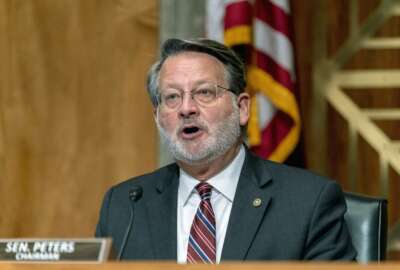To listen to the Federal Newscast on your phone or mobile device, subscribe in PodcastOne or Apple Podcasts. The best listening experience on desktop can be found using Chrome, Firefox or Safari.
- President Biden has managed to get fewer of his nominees confirmed to federal agency leadership positions than two of his most recent predecessors. But it’s not for lack of trying. That’s according to a new data analysis by the Partnership for Public Service. In his first year, President Biden nominated 644 people — about the same number of officials as former presidents Obama and George W. Bush did in the same timeframe, and more than former President Trump. The Senate confirmation process appears to be the hang-up. The Senate confirmed just 355 of those nominees in the first year, and sent 118 back to the White House simply because their nominations expired.
- Federal employees give mixed feedback on office reentry plans in a new survey. The President’s Management Council is releasing the first data from its Federal Pulse Survey that launched last October. It’s a pilot program aimed at getting more real-time data from feds than more established methods like the Federal Employee Viewpoint Survey. Federal employees, on average, gave their most favorable scores to supervisors helping them navigate conversations about office reentry. Employees at the National Science Foundation gave the highest scores on office reentry plans, but civilian employees at the Defense Department gave the lowest scores. (Federal News Network)
- Employees at the Equal Opportunity Commission will not be returning to the office in the near future. The American Federation of Government Employees said the commission reversed course and decided not to bring employees back into the office in January. AFGE had filed two unfair labor practice charges in November and December after EEOC Chairwoman Charlotte Burrows announced at a town hall meeting that employees would be required to return to offices. She also said there were no plans to expand the telework program that was in place prior to the pandemic. AFGE said none of the changes were negotiated with the union as required by their contract.
- The Postal Service has conflicting guidance on how to deal with the growing number of employees on unscheduled leave. That’s according to a report from the Office of Inspector General. The IG looked at 24 facilities across the country and found that USPS has no standardized procedure for disciplining extended AWOL employees and collecting documentation for them. Between 2018 and 2020, over 78,000 USPS employees accumulated over 5.9 million hours of unscheduled leave, according to the report. The IG recommends USPS update its policy for recording absence without leave, and provide training for supervisors on how to manage AWOL employees.
- OPM is offering some food for thought as agencies elevate diversity, equity and inclusion principles. As agencies finalize their plans to embed diversity, equity, inclusion and accessibility in their workforce strategies, the Office of Personnel Management is offering some considerations for the type of executive to lead these efforts. OPM says agencies who decide to establish a chief diversity officer or a diversity and inclusion officer should ensure they have the expertise and resources to sustain progress over time. Additionally, OPM says these leaders should report to the secretary and be in a position to promote collaboration across the department. Agencies DEI&A plans are due to OMB by March 23. OPM is holding a forum today to assist agencies in reimagining the CDO or DOI role.
- The Interior Department is seeking to change the names of some of the country’s geographic features deemed derogatory. Last November, Secretary Deb Haaland announced that the department would establish a process to rename federal lands that have racist terms in their titles. Now, that effort makes significant progress with the Advisory Committee on Reconciliation in Place Names soliciting nominations for members. The committee will have representatives from Indian tribes and a Native Hawaiian organization, as well as people with backgrounds in civil rights, history and geography.
- NASA is making a new hire to serve as its chief science and senior climate adviser. Katherine Calvin is joining NASA in this new dual-hatted role. She’ll take over for Jim Green, who served as NASA’s chief scientist for more than 40 years, and will be the agency’s first permanent senior climate advisor since it created the position last year. That’s when NASA joined the National Climate Task Force created in an executive signed by President Joe Biden.
- House lawmakers are eyeing updates to the law governing federal cybersecurity practices. The Committee on Oversight and Reform meets today to discuss modernizing the Federal Information Security Management Act. Former federal chief information security officer Grant Schneider is among those testifying. He’ll recommend lawmakers clarify cyber roles and responsibilities. Both the Cybersecurity and Infrastructure Security Agency and the Office of the National Cyber Director weren’t around when FISMA was last updated. And Schneider is also urging lawmakers to codify the federal CISO’s authorities into law.
- Agencies are continuing to respond to a widespread software vulnerability. The Cybersecurity and Infrastructure Security Agency hasn’t seen any big cyber attacks stemming from the “Log4J” vulnerability. CISA said agencies have remediated thousands of network assets. But with Log4J being used in hundreds of thousands of products worldwide, CISA Director Jen Easterly said it’s not time to let your guard down. “We do expect Log4Shell to be used in intrusions well into the future. And for this reason, we are remaining focused on driving remediation of vulnerable assets for months to come,” she said during a Monday call with reporters. (Federal News Network)
- The Air Force is launching a new application for office and enlisted evaluations. The service says it is part of its ongoing IT updates and shift to the digital age. The MyEval application will auto-populate information, introduce a click to sign feature and bring in information from other systems to reduce the number of documents that need to be attached. The Air Force is planning on having the whole system rolled out by early February.
- Veterans eligible for VA health care would get automatically enrolled under a new bill in the House. Congressman Mark Takano (D-Cal.) introduced the EVEST Act, which would require the Department of Veterans Affairs to notify all eligible veterans of their enrollment, as well as instructions for how to opt out, no later than 60 days after receiving eligibility information from the Defense Manpower Data Center at DoD. The legislation would also require VA to ensure all eligible veterans are able to access an electronic tool for opting out by the start of August 2022.
- The Department of Veterans Affairs is proposing to eliminate copayments for mental health visits in an effort to encourage psychiatric care. This program would also reduce copayments for medications prescribed to veterans who are identified as a high risk for suicide. If accepted, these changes would reduce costs for veterans who need to make frequent visits to renew their mental health prescriptions. Comments are due March 7.
- The IRS will start accepting and processing 2021 tax returns on January 24, more than two weeks earlier than when it started last year’s filing season. The agency warns a surge in COVID-19 infections and Congress giving it less funding than what the Biden administration asked for could making this year’s filing season challenging. IRS Commissioner Chuck Rettig urges taxpayers to file electronically to reduce processing delays. The deadline for tax returns this year is April 18. (Federal News Network)
Copyright
© 2025 Federal News Network. All rights reserved. This website is not intended for users located within the European Economic Area.





